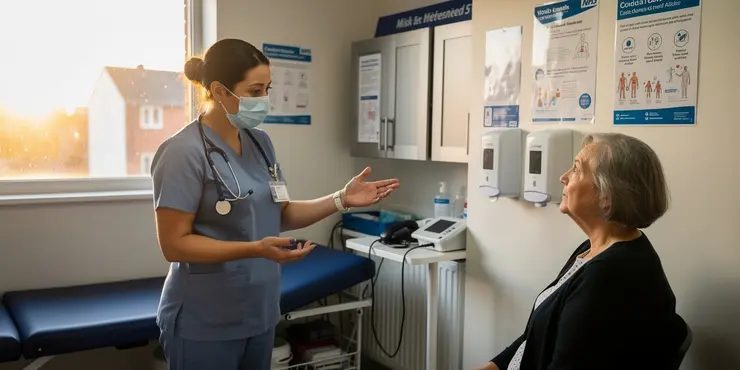
Find Help
More Items From Ergsy search
-
What is a COVID-19 variant?
Relevance: 100%
-
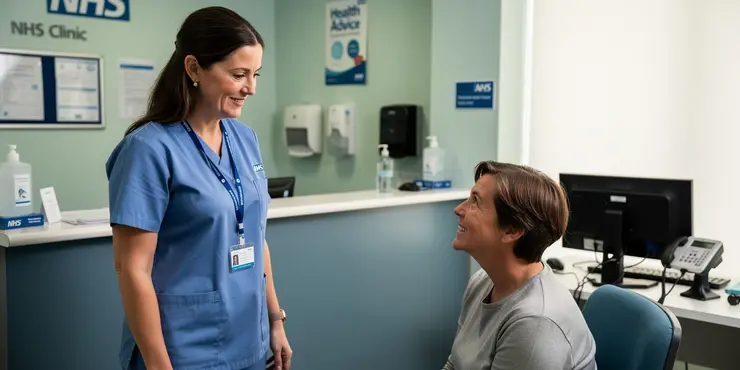
How can I protect myself from new COVID-19 variants?
Relevance: 98%
-
What is the Covid-19 Stratus variant?
Relevance: 97%
-
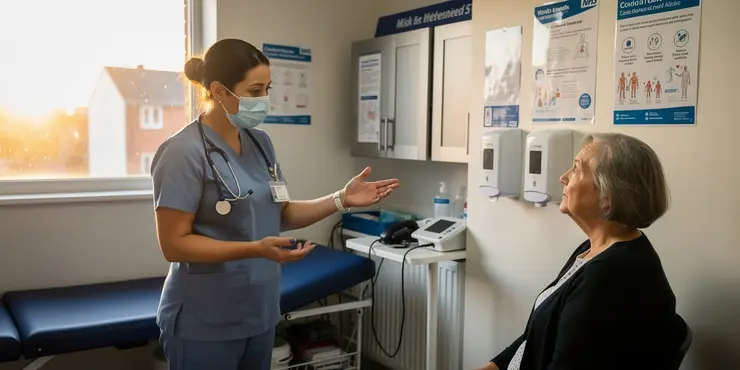
How can I protect myself from Covid-19 variants?
Relevance: 96%
-
How are COVID-19 variants detected?
Relevance: 94%
-
How do COVID-19 variants arise?
Relevance: 90%
-
Where can I learn about real Covid-19 variants?
Relevance: 89%
-
Do new variants affect COVID-19 testing?
Relevance: 89%
-

Do vaccines work against new COVID-19 variants?
Relevance: 87%
-
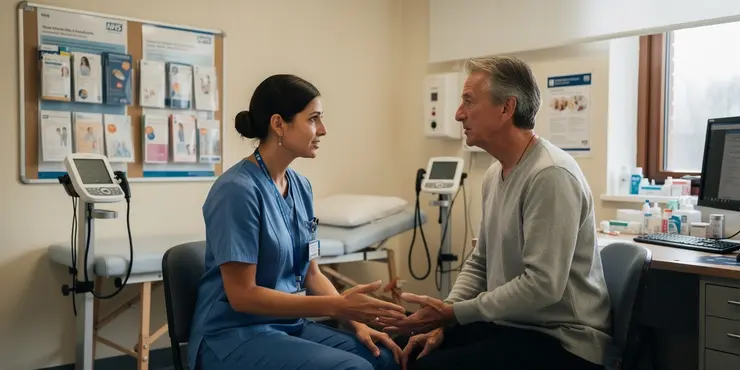
Are new COVID-19 variants more dangerous?
Relevance: 87%
-
What is the process to identify a new Covid-19 variant?
Relevance: 85%
-
Does the flu vaccine protect against COVID-19?
Relevance: 85%
-
How often do new COVID-19 variants emerge?
Relevance: 84%
-

How do scientists name new Covid-19 variants?
Relevance: 84%
-
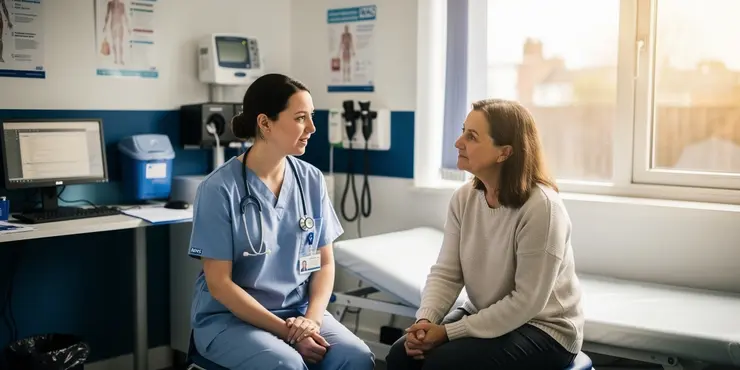
Should I get vaccinated if I already had COVID-19?
Relevance: 80%
-
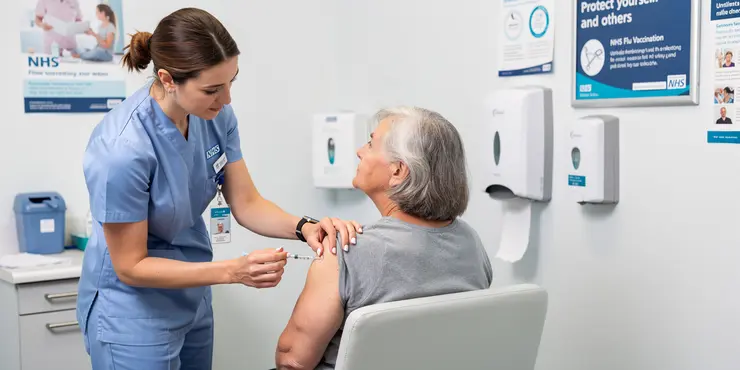
Will getting the flu jab protect me against COVID-19?
Relevance: 78%
-
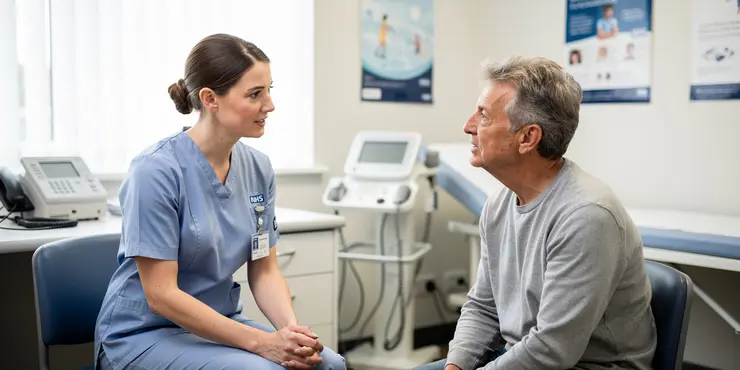
What sources should I consult for information on Covid-19?
Relevance: 72%
-
Can the COVID jab give me COVID-19?
Relevance: 70%
-
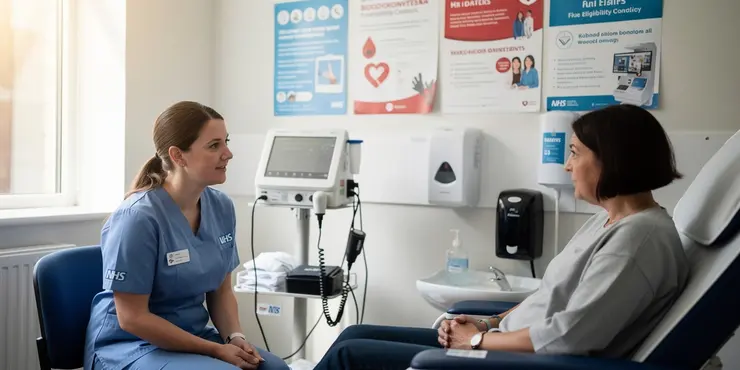
Can COVID-19 be transmitted through blood transfusions?
Relevance: 66%
-
Does travel insurance cover COVID-19 related issues?
Relevance: 65%
-
What are the COVID-19 travel restrictions for traveling to Spain?
Relevance: 63%
-
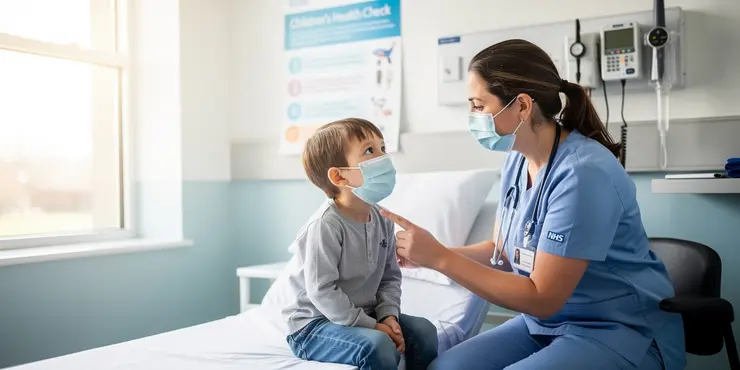
Are children more affected by new variants of COVID?
Relevance: 62%
-
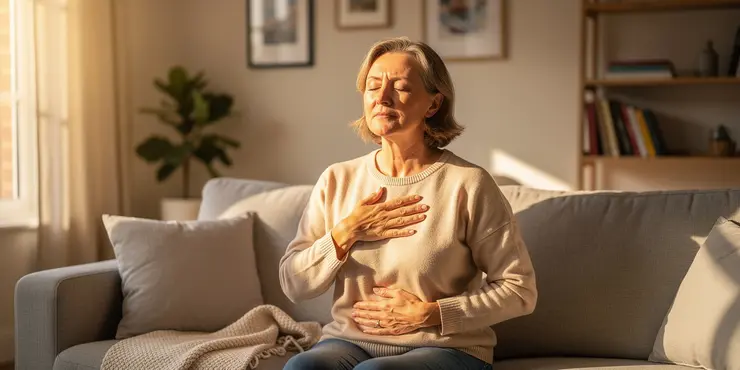
Breathlessness after COVID-19 - helpful techniques
Relevance: 61%
-
Can air physiotherapy help with COVID-19 recovery?
Relevance: 61%
-

What are the Nimbus and Stratus variants of Covid?
Relevance: 60%
-
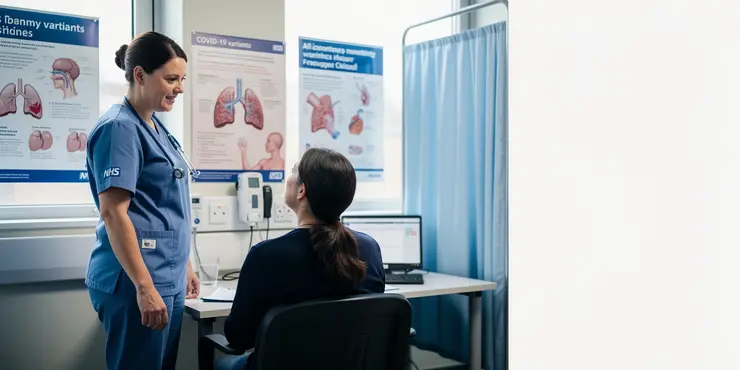
Can new variants cause reinfection?
Relevance: 59%
-
New Covid Variant Strains
Relevance: 58%
-
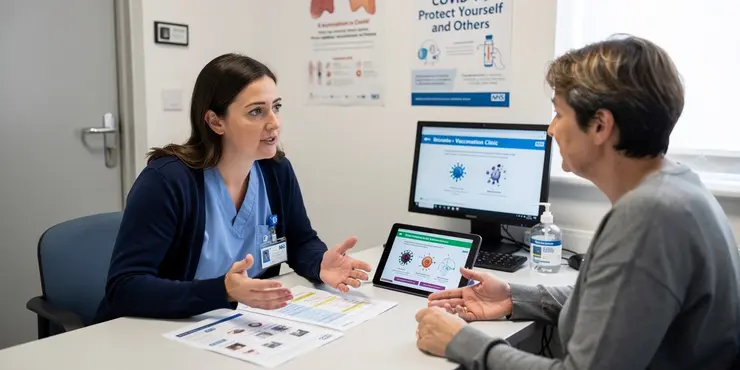
Are new variants more transmissible?
Relevance: 56%
-
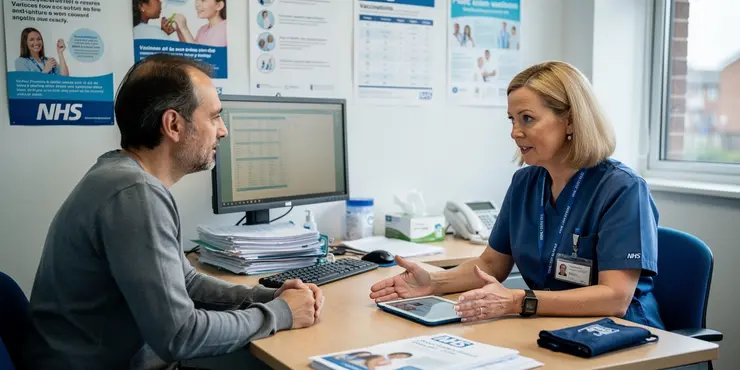
Do vaccines protect against the Stratus variant?
Relevance: 56%
-

Is there concern about new hypothetical variants like Nimbus and Stratus?
Relevance: 53%
-
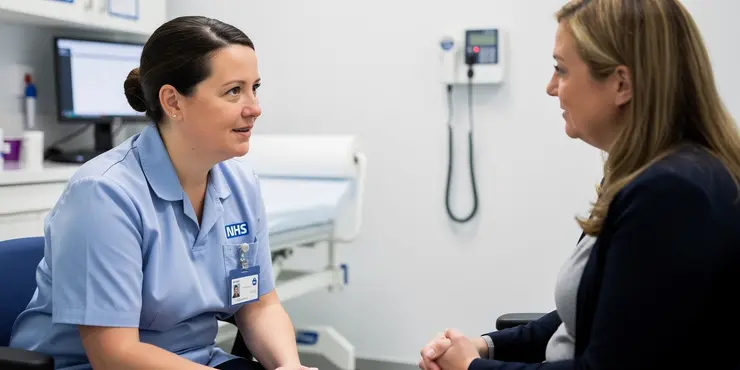
Is the Nimbus variant more contagious?
Relevance: 47%
-
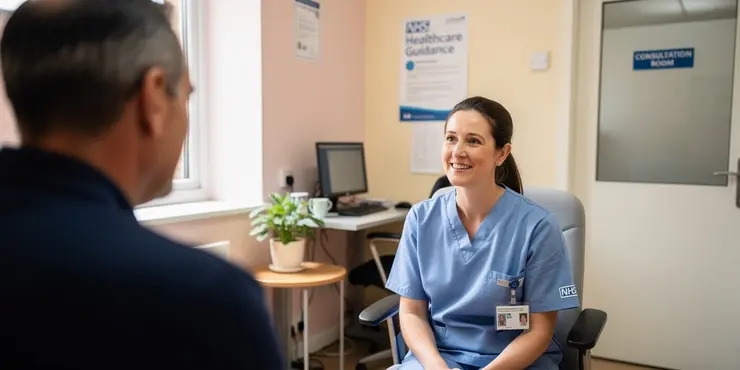
Should I be worried about new variants?
Relevance: 46%
-
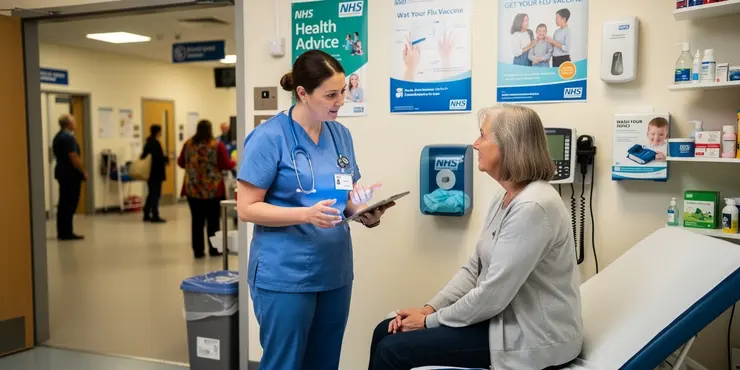
What would happen if the Nimbus variant existed?
Relevance: 45%
-
What are some well-known COVID-19 variants?
Relevance: 45%
-
Are the symptoms different with new COVID-19 variants?
Relevance: 45%
-
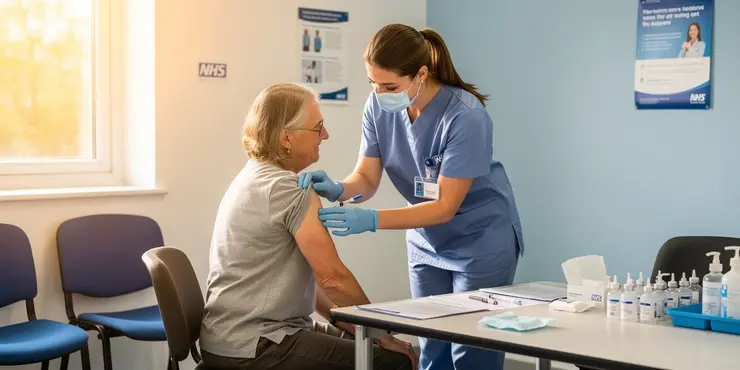
when will i need my next COVID jab?
Relevance: 44%
-
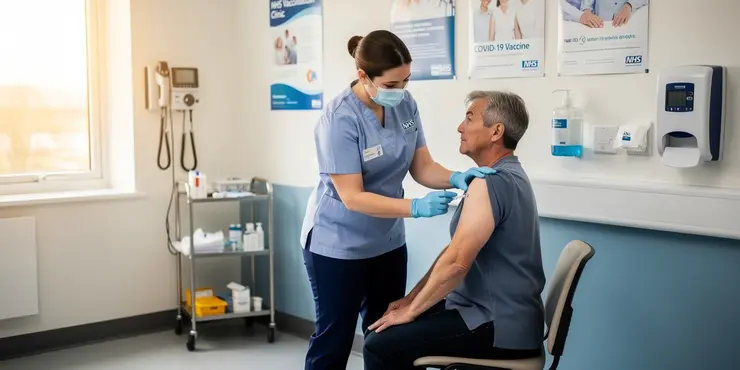
Are COVID jabs safe?
Relevance: 41%
-
Can current treatments handle new COVID-19 variants?
Relevance: 39%
-
What is being done globally to track COVID-19 variants?
Relevance: 39%
-
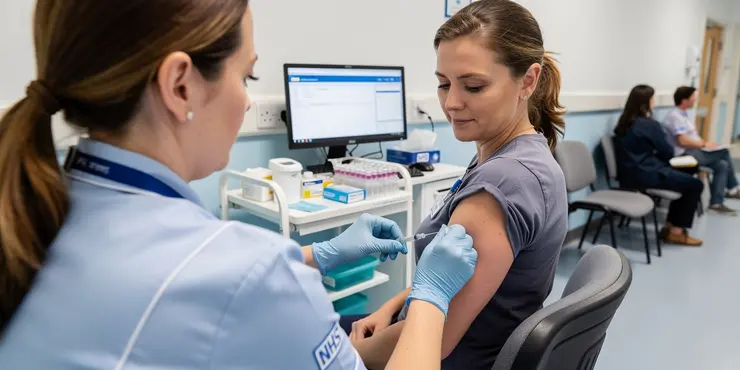
What is a booster jab, and do I need one?
Relevance: 39%
Understanding Covid-19 Variants
Covid-19 variants are mutations of the original SARS-CoV-2 virus. These variants may spread more easily, cause more severe disease, or evade immunity from previous infections or vaccinations. Staying informed about variants is crucial for implementing effective protection measures. The UK government and the NHS frequently update guidance based on the latest research and evidence.
Get Vaccinated
Vaccination is one of the most effective ways to protect yourself against Covid-19 and its variants. The vaccines used in the UK have been shown to provide significant protection against severe illness and hospitalisation. Booster doses are recommended to enhance or restore protection, especially against newer variants. Make sure to get vaccinated as soon as you are eligible and stay up to date with booster doses as advised by the NHS.
Practice Good Hygiene
Good hygiene practices remain critical in preventing the spread of Covid-19. Wash your hands thoroughly with soap and water for at least 20 seconds, especially after being in a public place or after blowing your nose, coughing, or sneezing. If soap and water are not available, use a hand sanitiser containing at least 60% alcohol. Avoid touching your face, particularly your eyes, nose, and mouth, with unwashed hands.
Wear Face Coverings
Wearing face masks can reduce the spread of droplets that may carry the virus. In the UK, it is advisable to wear face coverings in crowded and enclosed spaces, especially where you come into contact with people you do not usually meet. Ensure that masks cover both your nose and mouth and fit snugly against the sides of your face without gaps.
Maintain Physical Distancing
Physically distancing yourself from others, particularly in indoor settings or crowded places, can reduce transmission risk. Keep at least two metres distance from people not from your household or support bubble, especially if they appear unwell. Limiting social interactions and avoiding crowded places can also help minimise contact with the virus.
Stay Informed on Local Guidelines
Local guidelines can offer specific advice based on the current state of the pandemic in your area. The UK government and public health authorities such as Public Health England regularly provide updates on Covid-19 measures, including changes in restrictions and guidance. Follow these updates to ensure you are compliant with the latest recommendations and measures.
Monitor Your Health
Be vigilant about your health and monitor for symptoms of Covid-19, which can range from mild to severe. If you experience symptoms such as a high temperature, a new continuous cough, or a loss or change to your sense of smell or taste, self-isolate and get tested as soon as possible. Early detection and isolation help prevent the spread of the virus.
Conclusion
Protecting yourself from Covid-19 variants requires a combination of vaccination, good hygiene, face coverings, physical distancing, and staying informed. By following public health advice and remaining vigilant, you can help reduce the risk of infection and contribute to public health efforts in the UK.
Understanding Covid-19 Variants
Covid-19 variants are changes in the original virus. These changes might make the virus spread faster or be more dangerous. They might also make it harder for our bodies to fight the virus, even if we've had the virus before or got the vaccine. It's important to know about these changes so we can stay safe. The government and NHS give updates to keep everyone informed.
Get Vaccinated
Getting vaccinated is a strong way to stay safe from Covid-19 and its changes. The vaccines in the UK help prevent you from getting very sick. You may need extra shots to stay protected, especially against new variants. Get your vaccine when it's your turn, and listen to the NHS for when to get more doses.
Practice Good Hygiene
Keeping clean helps stop germs from spreading. Wash your hands with soap and water for 20 seconds, especially after going out or if you cough or sneeze. If you can't use soap and water, use hand gel with 60% alcohol. Try not to touch your face with dirty hands.
Wear Face Coverings
Face masks help stop virus droplets from spreading. In the UK, wear a mask in busy places or when you're near people you don't usually see. Make sure the mask covers your nose and mouth and fits well on your face without gaps.
Maintain Physical Distancing
Stay apart from others to stop the virus from spreading. Keep two metres away from people not in your home, especially if they look sick. Try not to be in crowded places and meet fewer people to avoid the virus.
Stay Informed on Local Guidelines
Local rules tell you what to do. The government and health experts give updates on what to do to stay safe. Always check these updates so you know the latest rules.
Monitor Your Health
Keep an eye on how you feel. Watch for signs like a fever, a new cough, or losing taste or smell. If you feel sick, stay away from others and get tested quickly. Finding out early helps stop the virus from spreading.
Conclusion
To stay safe from Covid-19 changes, get your vaccine, stay clean, wear masks, keep space, and keep up with the news. By following these rules, you help keep yourself and others healthy.
Frequently Asked Questions
What are the basic steps to protect myself from COVID-19 variants?
Continue practicing good hygiene, wearing masks, maintaining physical distance, ensuring proper ventilation, and getting vaccinated.
Should I get vaccinated to protect against COVID-19 variants?
Yes, vaccines are highly effective at preventing severe illness and can help protect against known variants.
Do COVID-19 variants spread more easily?
Some variants are known to spread more easily, which is why continued protective measures are important.
Will a mask protect me from new COVID-19 variants?
Wearing a well-fitted mask can help protect against the transmission of COVID-19, including its variants.
What type of mask is most effective against COVID-19 variants?
N95 or KN95 masks provide a high level of protection, but well-fitted surgical masks and multi-layer cloth masks are also effective.
Do I need a booster shot to protect against variants?
Booster shots are recommended to enhance or restore protection that may have decreased over time.
Is social distancing still necessary with the presence of COVID-19 variants?
Yes, maintaining physical distance is an effective way to reduce transmission risk.
Can hand hygiene help protect me from COVID-19 variants?
Regular hand washing with soap and water or using hand sanitizer reduces the risk of virus transmission.
What role does ventilation play in protecting against variants?
Improving airflow and ventilation can help reduce the concentration of virus particles in the air.
Are outdoor gatherings safer than indoor ones?
Yes, outdoor gatherings are generally safer due to better ventilation and air circulation.
Should I avoid travel due to COVID-19 variants?
Avoid non-essential travel, especially to areas with high transmission rates or where variants are prevalent.
Can I still get infected after vaccination?
Breakthrough infections are possible, but vaccines significantly reduce the risk of severe illness and hospitalization.
Should I avoid large gatherings to protect against variants?
Yes, avoid large indoor gatherings to minimize the risk of exposure and transmission.
How does testing help protect against variants?
Regular testing can help identify and isolate cases quickly, reducing the spread of the virus.
What should I do if I have COVID-19 symptoms?
Self-isolate and seek medical advice or testing to confirm infection and prevent spreading the virus.
Do children need protection against COVID-19 variants?
Yes, children can also get infected and should follow preventive measures, including vaccination if eligible.
How can businesses help protect people from variants?
Businesses can implement health protocols, improve ventilation, encourage remote work, and support vaccination efforts.
Does having antibodies from a previous infection protect against variants?
Having antibodies may offer some protection, but vaccination provides stronger and more reliable immunity.
Should I continue to follow public health updates?
Yes, staying informed about public health guidelines can help you adapt to new information and variants.
Can maintaining a healthy lifestyle protect against COVID-19 variants?
A healthy lifestyle supports the immune system, but it should be combined with other preventive measures like vaccination.
How can I stay safe from COVID-19 variants?
Here are some simple steps to help you stay safe:
- Wear a mask over your nose and mouth.
- Wash your hands with soap for 20 seconds.
- Stay away from people who are sick.
- Get the COVID-19 vaccine if you can.
- Keep a safe distance from others in busy places.
Using pictures or videos can make these steps easier to remember. You can also ask someone to help you understand or follow these steps.
Keep doing these things to stay healthy:
- Wash your hands often.
- Wear a mask.
- Stay at least 6 feet away from other people.
- Keep windows open for fresh air.
- Get your vaccine.
You can also use helpful tools like picture charts or apps that remind you to wash your hands and wear a mask.
Should I get a COVID-19 shot to stay safe from new virus types?
Yes, vaccines work very well to stop people from getting really sick. They also help protect us from different types of the virus.
Do COVID-19 variants spread more easily?
Some new COVID-19 types can spread faster. This means they can make more people sick quickly.
If you are worried, you can:
- Wear a mask
- Wash your hands often
- Stay away from people who are sick
These help keep you safe. If you need help, ask someone you trust.
Some kinds of the virus can spread fast. This is why we still need to be careful and protect ourselves.
Will a mask keep me safe from new COVID-19 types?
Masks help keep us safe from COVID-19. They cover our nose and mouth.
The new types of COVID-19 can still spread. Wearing a mask can help stop the germs.
Wash your hands often and use hand sanitizer. Stay a little away from others if you can.
You can also ask a family member or friend for help to understand more about staying safe.
Wearing a mask that fits well can help keep you safe from COVID-19.
What mask works best against new COVID-19 types?
Masks help keep us safe from COVID-19. Some masks work better than others.
Here are some tips to help you choose a mask:
- Use a mask that fits well over your nose and mouth.
- A mask with multiple layers is better.
- Masks with filters give more protection.
If you need help putting on a mask, ask someone you trust.
N95 and KN95 masks give you really good protection. But, if you wear a surgical mask that fits well, or a cloth mask with more than one layer, they can work well too.
Do I need another vaccine shot to stay safe from virus changes?
Booster shots are extra doses of a vaccine. They help keep you protected when the first shots start to wear off.
Do we still need to keep apart because of different types of COVID-19?
Yes, keeping space between people helps stop germs from spreading.
Can washing my hands keep me safe from new COVID-19 viruses?
Washing your hands often with soap and water helps stop viruses from spreading. You can also use hand sanitizer.
How does fresh air help protect us from new germs?
Fresh air is important to keep us safe from new germs or viruses. Open windows and doors to let in fresh air and stop germs from spreading. This helps keep the air clean and healthy.
Here are some tips to help with fresh air:
- Open windows when you can.
- Use a fan to blow air around.
- Go outside for fresh air if it's safe.
Getting fresh air can be an easy way to stay healthy and safe!
Making air move better can help get rid of virus germs in the air.
Is it safer to meet outside than inside?
Meeting outside is often safer than meeting inside.
Wind and fresh air outside can help keep germs away.
Tools and techniques to stay safe:
- Stay away from people who are sick.
- Keep a distance from others if you can.
- Wash your hands with soap and water.
Yes, meeting people outside is usually safer because the fresh air moves around better.
Is it safe to travel because of new COVID-19 types?
It's important to stay safe. Here are some tips:
- Check the news for any travel warnings.
- Ask a trusted adult or a doctor for advice.
- Wear a mask if many people are around.
- Wash your hands often with soap and water.
- Keep some distance from other people.
These steps help keep you protected.
Try not to travel if you don't need to, especially to places where lots of people have the virus or where there are new kinds of the virus.
Can I get sick after the vaccine?
Yes, you might still get sick even after you have the vaccine. But the vaccine helps your body fight the sickness better.
Here are some ways to stay healthy:
- Wash your hands often with soap and water.
- Keep some distance from people who are sick.
- Wear a mask if needed.
- Eat healthy food and get plenty of rest.
You can still get sick after getting a vaccine, but vaccines make it much less likely that you will get really sick or need to go to the hospital.
Here are some tips to help understand this better:
- Vaccines are like shields that help protect us from getting very sick.
- If you do get sick, it won't be as bad if you have had the vaccine.
- Always wash your hands and wear a mask in crowded places to stay extra safe.
Is it a good idea to stay away from big groups to stay safe from new germs?
Big groups of people can spread new germs and make people sick. If you don't want to get sick, it might help to keep away from big crowds.
Helpful Tips:
- Use a mask to cover your nose and mouth.
- Wash your hands with soap and water often.
- Stay 3 feet away from people you don't live with.
- If you feel sick, stay at home and rest.
Yes, it is best to stay away from big groups of people inside. This helps you stay safe from getting sick or making others sick.
How does testing stop new versions of a virus from spreading?
Testing often helps find people who have the virus. This means they can stay away from others, so fewer people get sick.
What should I do if I feel sick with COVID-19?
If you think you have COVID-19, do these things:
- Stay at home and rest. Do not go to work or school.
- Drink lots of water.
- Call a doctor or nurse. They will tell you what to do next.
- Cover your mouth if you cough or sneeze.
- Wash your hands a lot with soap and water.
You can also ask a friend or family member to help you.
There are apps and websites that can help you understand more about COVID-19. They can show you pictures and videos.
If you feel sick, stay at home and away from other people. Ask a doctor or nurse if you need a test to see if you have the virus. This helps to keep everyone safe.
Do kids need safety from new COVID-19 types?
COVID-19 is a sickness you can catch. It can change and become new types. These are called "variants."
Kids can get sick from COVID-19 and its variants. It is important to keep them safe.
Ways to protect kids:
- Make sure they wash their hands often.
- Help them wear masks when needed.
- Talk to a doctor about a COVID-19 vaccine for kids.
Some tools that can help:
- Fun stories or videos about staying healthy.
- Colorful posters showing how to wash hands.
It's good to ask a grown-up if you have questions.
Yes, children can get sick too. They should stay safe by doing things like washing hands and getting a vaccine if they can.
How can businesses keep people safe from different kinds of viruses?
Businesses can help in simple ways:
- Make sure everyone washes their hands often.
- Ask people to wear masks.
- Keep places clean and tidy.
- Let people know how to stay safe.
Tools that can help:
- Posters with safety tips.
- Hand sanitizer stations.
- Regular cleaning plans.
Businesses can do things to help people stay healthy. They can make sure there is fresh air, let people work from home, and help with getting vaccines.
Can antibodies from being sick before protect me from new versions of the virus?
When we get sick, our body makes something called antibodies to help fight the germs. If we get the same illness again, these antibodies help us not get sick again.
But sometimes, germs change over time. These new versions of the germs are called variants. Our antibodies might not work as well against these new versions.
It is important to stay healthy and talk to a doctor about ways to protect yourself, like getting vaccines.
If you need help understanding or remembering this, you can:
- Use pictures or diagrams to see how antibodies work.
- Ask someone you trust to explain it to you.
- Write down new words or ideas and talk about them with a friend or family member.
Having antibodies can help protect you a bit, but getting a vaccine makes you even safer and works better.
Should I keep listening to health news?
It's good to know what's happening with health news.
Listening to news can help you stay safe.
You can ask someone you trust to help you understand the news.
Try using apps that read the news out loud if you find it hard to read.
Yes, keeping up with health rules can help you understand new information and changes.
Can living healthy help stop COVID-19 variants?
Staying healthy might help fight off some COVID-19 variants, but it is not a sure way to stop them.
You can live healthy by:
- Eating fruits and vegetables
- Exercising every day
- Getting enough sleep
- Washing your hands often
- Wearing a mask when needed
It's also good to get your COVID-19 vaccine. The vaccine helps protect you.
If you need help reading, you can:
- Ask someone to read it out loud
- Use apps that read text for you
Living healthy helps your body fight germs. But, it is also important to get your vaccines to stay safe.
Useful Links
This website offers general information and is not a substitute for professional advice.
Always seek guidance from qualified professionals.
If you have any medical concerns or need urgent help, contact a healthcare professional or emergency services immediately.
Some of this content was generated with AI assistance. We’ve done our best to keep it accurate, helpful, and human-friendly.
- Ergsy carfully checks the information in the videos we provide here.
- Videos shown by Youtube after a video has completed, have NOT been reviewed by ERGSY.
- To view, click the arrow in centre of video.
- Most of the videos you find here will have subtitles and/or closed captions available.
- You may need to turn these on, and choose your preferred language.
- Go to the video you'd like to watch.
- If closed captions (CC) are available, settings will be visible on the bottom right of the video player.
- To turn on Captions, click settings .
- To turn off Captions, click settings again.
More Items From Ergsy search
-
What is a COVID-19 variant?
Relevance: 100%
-

How can I protect myself from new COVID-19 variants?
Relevance: 98%
-
What is the Covid-19 Stratus variant?
Relevance: 97%
-

How can I protect myself from Covid-19 variants?
Relevance: 96%
-
How are COVID-19 variants detected?
Relevance: 94%
-
How do COVID-19 variants arise?
Relevance: 90%
-
Where can I learn about real Covid-19 variants?
Relevance: 89%
-
Do new variants affect COVID-19 testing?
Relevance: 89%
-

Do vaccines work against new COVID-19 variants?
Relevance: 87%
-

Are new COVID-19 variants more dangerous?
Relevance: 87%
-
What is the process to identify a new Covid-19 variant?
Relevance: 85%
-
Does the flu vaccine protect against COVID-19?
Relevance: 85%
-
How often do new COVID-19 variants emerge?
Relevance: 84%
-

How do scientists name new Covid-19 variants?
Relevance: 84%
-

Should I get vaccinated if I already had COVID-19?
Relevance: 80%
-

Will getting the flu jab protect me against COVID-19?
Relevance: 78%
-

What sources should I consult for information on Covid-19?
Relevance: 72%
-
Can the COVID jab give me COVID-19?
Relevance: 70%
-

Can COVID-19 be transmitted through blood transfusions?
Relevance: 66%
-
Does travel insurance cover COVID-19 related issues?
Relevance: 65%
-
What are the COVID-19 travel restrictions for traveling to Spain?
Relevance: 63%
-

Are children more affected by new variants of COVID?
Relevance: 62%
-

Breathlessness after COVID-19 - helpful techniques
Relevance: 61%
-
Can air physiotherapy help with COVID-19 recovery?
Relevance: 61%
-

What are the Nimbus and Stratus variants of Covid?
Relevance: 60%
-

Can new variants cause reinfection?
Relevance: 59%
-
New Covid Variant Strains
Relevance: 58%
-

Are new variants more transmissible?
Relevance: 56%
-

Do vaccines protect against the Stratus variant?
Relevance: 56%
-

Is there concern about new hypothetical variants like Nimbus and Stratus?
Relevance: 53%
-

Is the Nimbus variant more contagious?
Relevance: 47%
-

Should I be worried about new variants?
Relevance: 46%
-

What would happen if the Nimbus variant existed?
Relevance: 45%
-
What are some well-known COVID-19 variants?
Relevance: 45%
-
Are the symptoms different with new COVID-19 variants?
Relevance: 45%
-

when will i need my next COVID jab?
Relevance: 44%
-

Are COVID jabs safe?
Relevance: 41%
-
Can current treatments handle new COVID-19 variants?
Relevance: 39%
-
What is being done globally to track COVID-19 variants?
Relevance: 39%
-

What is a booster jab, and do I need one?
Relevance: 39%


